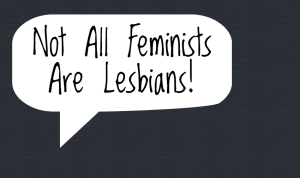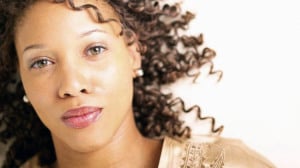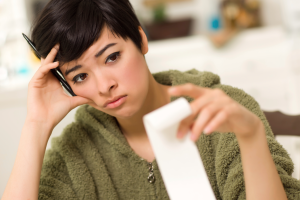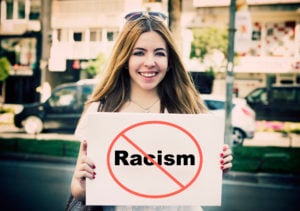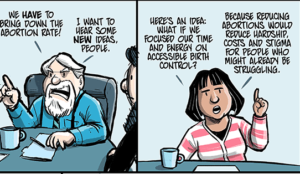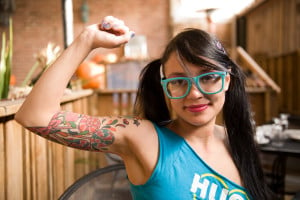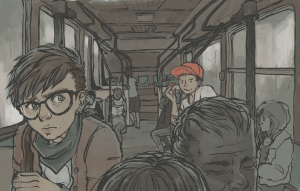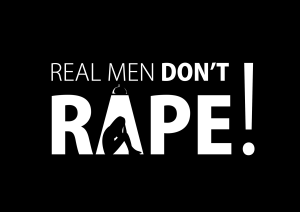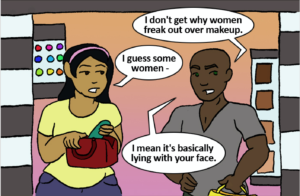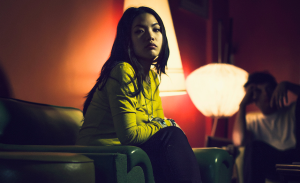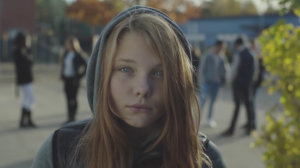I came out and of age in the feminist movement, which means that I have done a lot of work alongside straight women – a lot of which has centered around bringing people into the movement, educating folks about what feminism is, dispelling myths about what it isn’t, and doing modern-day consciousness raising to get more people involved on a global level.
And it’s in those feminist recruitment spaces that I find that many well-intentioned, totally awesome, usually straight colleagues pull out an old and tired line we’re all familiar with: “We’re not all lesbians!”
Unfortunately, many of the myths about feminism that scare people away are more concerned with who feminists are than what we do or believe in.
People are worried we’re all bra-burning, man-hating, witchcraft-practicing lesbians who refuse to shave and don’t give a damn about looking good.
To which I say: So what if we are?
If all feminists were queer women with unshaved legs who embraced their bodies regardless of what they looked like and gathered in the woods to cast spells, I wouldn’t give a damn. Because none of that matters!
Some feminists are thin and some are fat. Some are queer and some are straight. Some shave and some don’t.
None of that changes what feminism is truly about: building space, and ultimately, an entire planet, in which all women are safe – no matter who they are.
And that’s why when we tell people we’re not all fat and we’re not all ugly and we’re not all lesbians – even though we know that having people of different sizes, appearances, and sexualities in the movement doesn’t matter, and actually makes it stronger – we’re doing it a huge disservice.
Feminism is a movement that’s based in breaking norms.
It’s often perceived as being, first and foremost, about breaking gender norms. Feminism rejects the idea that women should only be housewives and caretakers. Feminism rejects a gender binary that pits women against men, and then renders them subordinate. And feminism rejects the idea that there is any part of our genders or sexualities that should be dictated by other people’s expectations.
But feminism is also about breaking other norms, and often challenging the oppressive roots of our own cultures directly.
Feminism is a movement that declares that economic justice is tied to liberation. It’s a movement that challenges itself to be more inclusive of women of color, queer women, trans women, and agender and gender non-conforming people.
It’s a globally minded movement that amplifies the voices of people around the world who are advocating for themselves against patriarchy.
No, we’re not all lesbians. But some of us are. That’s one of the things that makes up the fabric of the modern-day feminist movement and shapes its direction. And that’s why proudly telling people “we’re not all lesbians” isn’t okay.
When we apologize for the things that make feminism radical or the aspects of our community and movement that smash normative ideas, we misrepresent what we’re all about.
These three things are what you’re really saying when you tell people feminists “aren’t all lesbians.” And they’re three reasons you shouldn’t say it anymore.
1. It Defines Feminism by Oppressive Standards of Normality
When we talk about the norm, we’re talking about a series of hurtful and oppressive social structures that maintain imbalances of power.
The norm is patriarchy, white supremacy, classism, heterosexism, cissexism, and a slew of other systems of privilege all wrapped up into one tiny phrase.
We’re brought up in a culture that tries to push that norm onto us – and one of the main goals of feminism is smashing that norm and replacing it with societal ideas that are more fair, equal, and balanced.
It’s societal norms that tell us women should be homemakers and mothers, and nothing more. It’s societal norms that tell us women should do all they can to please and attract men, and then define themselves in relation to those men.
It’s societal norms that tell us cis, thin, white women are the ideal – and that women of color and trans women are lesser than them. It’s societal norms that shame poor women. It’s societal norms that shame single moms.
And it’s societal norms that define queer women – and lesbians in particular – as unattractive, broken people who failed to fit into that rigid set of expectations.
As feminists, we should know better than to believe in those norms.
We should recognize and remember that queer women have been major players in the feminist movement. We should hold in reverence that they have redefined and challenged dominant feminist discourse, and broadened the scope of what women’s empowerment looked like in the process.
We should know that queer women, like other women who live at the intersections of oppression, are an asset to the feminist movement – and an important part of its life and trajectory.
And we shouldn’t apologize for it.
But that’s what we’re doing when we tell people we’re not all lesbians. When we say that, we’re caving to those norms.
We’re trying to make feminism more palatable and attractive, and we’re doing so by selling out some of our sisters.
In saying it, we are, in effect, incorrectly defining our own movement. Because even though we aren’t all lesbians, we are a movement that also understands and must stand for the idea that there’s nothing wrong with the fact that some of us are.
When we apologize for queer feminists, we’re communicating that we, in some way, stand for all those societal norms that hurt all women, and all people.
And that just ain’t right.
2. Because It Isolates (And Shames) Queer Feminists
Take it from me: When you’re queer and you hear someone apologizing for your identity, it doesn’t feel good.
Hearing my coworkers or fellow rabble-rousers tell people, “Don’t worry! We’re not all lesbians!” makes me feel like my identity – and my presence in the movement – is a burden or an embarrassment.
Hearing your colleagues apologize for who you are hurts. Because what I hear when people say “we’re not all lesbians” is that I, as a lesbian, don’t belong or am embraced in spite of who I am, and not in accordance with it.
Feminism has historically struggled with making space and time for queer women.
During the second wave, lesbians were collectively referred to as “the lavender menace” – a term feminists used to communicate that queer women, and their presence in feminist activism, made their movement look bad.
Feminists during that time felt that queer women hurt the cause simply by showing up and being proud of who they were. That history isn’t ancient, and the feminist movement still struggles to listen to and center queer women despite decades of debate, discussion, and collaboration between queer and straight women in the name of gender equality.
When queer women are spotlighted as something feminism is ashamed of, we’re not going to feel welcome or appreciated or safe in feminist spaces. When folks apologize for us, they humor and further the idea that our sexualities are bad.
When you comfort would-be feminists by telling them, “we’re not all lesbians!” you’re telling them that lesbians don’t actually belong.
But we do.
LGBTQIA+ rights and the feminist movement overlap often and have a lot in common. The fights for women’s liberation and queer liberation aren’t just parallel; they’re intertwined. For queer women, it isn’t possible to be truly empowered until we feel safe and embraced as women and as queer people.
We deserve space in the LGBTQIA+ rights movement, which has been historically dominated by cis gay men. And we sure as hell deserve space in the feminist movement, too.
It’s time for the specter of the lavender menace to finally disappear. And that means it’s time for feminists to stop insinuating that lesbians – and their presence in the feminist movement – makes feminism less valid, valuable, or awesome.
3. Because It Furthers Anti-Queer Stigma
It isn’t only the feminist movement, and feminists themselves, who have been cold to queer rights. It’s also society at large.
LGBTQIA+ folks have faced stigma for centuries, across borderlines and histories of civilizations.
And that stigma hurts. In fact, that stigma can kill.
LGBTQIA+ women – especially trans women, masculine-of-center queer women, non-binary women, and queer women of color – face higher rates of violence, harassment, and discrimination than many of their counterparts.
In our cissexist, patriarchal society, lesbians represent a very unique danger. In some ways, we are the ultimate “others.”
We are women who defy the normative idea of heterosexuality. We are women who claim our own identities in spite of a discourse that tells us those identities aren’t real. We are women who sometimes embrace masculinity, or who worship the feminine, or who refuse to listen to messages about ideal beauty standards shaped by the male gaze.
And we are women who face a whole lot of stigma, shame, and discrimination for doing so.
People are enraged by the notion that two women can form a family without a man, because sexist ideas tell us that women’s lives must be centered around a man. Some communities refuse to embrace our own brands of womanhood because societal norms have set up a rigid set of gender norms that force us to be a certain kind of woman, as if no other kinds exist.
When feminists attach shame to the notion of queerness, they further the anti-LGBTQIA+ stigma that has left queer women battered, bruised, and even dead.
The idea that being queer is bad, that queer women’s presence in the movement is negative, directly feeds into a culture that devalues LGBTQIA+ lives and renders LGBTQIA+ people invisible and victimized.
When we feed into those cultural ideas about LGBTQIA+ people, we also feed into patriarchy and sexism.
***
I believe deeply in a feminism that leaves room for the rest of us.
I want my feminism to be one that makes space for conversations about class, race, gender, and sexuality. I want my feminism to be one in which people become part of the movement because what jazzes them up is the idea of fighting for the right of every woman – of all women – no matter what.
The feminist movement has helped me learn how to stop apologizing for who I am.
Feminism taught me how to stand up and be proud of every part of me.
Feminism taught me how to talk about my experiences as a mixed-race queer person from a working-class background without lowering my voice or feeling any shame. Feminism taught me how to love my body, and who I was on the inside, and where I was going, and what I wanted.
I don’t want to be part of a feminist movement that apologizes for anyone or for anything that we are. I don’t want to be part of a feminist movement that holds up and deifies the normative.
I don’t want to be part of a feminist movement that ever repurposes any of the garbage we learn in the world that makes us feel like we are less-than, or bad, or unworthy.
I don’t think any of us do.
We’re not all lesbians. But some of us are. I am. And sorry, but I’m not sorry about it at all.
[do_widget id=’text-101′]
Carmen Rios is a Contributing Writer for Everyday Feminism. She splits her time disparately between feminist rabble-rousing, writing, public speaking, and flower-picking. A professional feminist by day and overemotional writer by night, Carmen is currently Communications Coordinator at the Feminist Majority Foundation and the Feminism and Community Editor at Autostraddle. You can follow her on Twitter @carmenriosss and Tumblr to learn more about her feelings.
Search our 3000+ articles!
Read our articles about:
Our online racial justice training
Used by hundreds of universities, non-profits, and businesses.
Click to learn more


